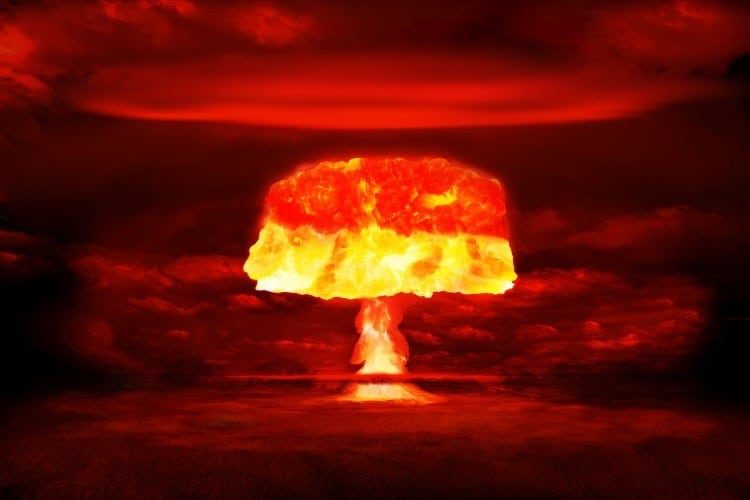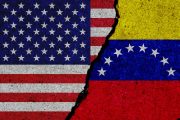
Russian President Vladimir Putin’s announcement on Sunday that he has placed his country’s nuclear forces in a state of “special combat readiness” has media speculating about the looming prospect of devastating war. When CBS News reporter Nancy Cordes asked President Joe Biden at the White House on Monday whether Americans should be worried, his curt reply was, “No.”
Despite reassurance such as that, there may be a few who prefer to err on the side of caution and prepare for the worst. Luckily, the Federal Emergency Management Agency (FEMA) offers advice at its disaster-planning website, Ready.gov. In case of nuclear explosion, get inside, remove contaminated clothing, and “maintain a distance of at least six feet between yourself and people who are not part of your household.” Oh, and if possible, “wear a mask.”
“Libs of Tik Tok” tweeted the Ready.gov gem on Sunday evening:
Commenting on the find at ZeroHedge, Tyler Durden wrote, “The US government has a long history of fun and interesting advice when it comes to imminent death,” followed by an old “Duck and Cover” filmstrip from the 1950s.
FEMA goes on to advise that after a nuclear attack, everyone should stay inside for 24 hours to avoid fallout dangers. However, cautions the agency: “Continue to practice social distancing by wearing a mask and keeping a distance of at least six feet between yourself and people who are not part of your household.” Afterwards, if evacuation is necessary, “try to bring items that can help protect yourself and your family from COVID-19,” including “two masks per person.” FEMA also recommends reviewing CDC’s guidelines for “Going to a Public Disaster Shelter During the COVID-19 Pandemic.”
For those unfortunates who suffer severe injuries from the nuclear blast, radiation sickness, burns, flying debris or fallout, FEMA also provides guidelines: “If you are experiencing a medical emergency, call 9-1-1 and let the operator know if you have, or think you might have, COVID-19. If you can, put on a mask before help arrives.” (Emphasis added.)
As if the above were not ridiculous enough, in closing, the agency counsels, “Many people may already feel fear and anxiety about the coronavirus 2019 (COVID-19). The threat of a nuclear explosion can add additional stress.” It provides an additional hyperlink to CDC’s instructions on “managing stress during COVID-19.”
Atomic Bomb Horrors
Considering the horrifying accounts from Hiroshima and Nagasaki survivors, this level of Covid-induced myopia is not laughable; it is insulting and inexcusable. Author Charles Pellegrino vividly recounts thousands of eyewitness statements in his books The Last Train from Hiroshima (2010) and To Hell and Back: The Last Train from Hiroshima (2015), about the city where more than 140,000 died on August 6, 1945. Harrowing memories included one survivor’s description of “ant-walking alligators” — people who did not die immediately but whose skin had been seared from their bodies leaving a black, leathery appearance as they staggered aimlessly in shock. According to Pellegrino:
The alligator people did not scream. Their mouths could not form the sounds. The noise they made was worse than screaming. They uttered a continuous murmur — like locusts on a midsummer night. One man, staggering on charred stumps of legs, was carrying a dead baby upside down.
As for A-bomb survivors, Japan teamed with the United States in the 1950s to analyze health effects of more than 100,000 Japanese and their children. The Radiation Effects Research Foundation (RERF) meticulously chronicles their medical histories which included both acute and long-term symptoms in those who received radiation doses above a “threshold” limit, below which negative effects do not appear. Although RERF has found no genetic defects or increased mortality or cancer among survivors’ children, the foundation has recorded increased cancers, cataracts, thyroid disorders, heart disease, stroke, and inflammatory syndromes among survivors.
Contrast this with COVID-19 research published in the January 2021 Bulletin of the World Health Organization. It reported a survival rate from SARS-CoV-2 of more than 99.6 percent.
There is obviously little comparison between COVID-19 and the explosion of an atomic bomb. Regardless, FEMA wants to be sure to keep you as safe as possible from the virus while you attempt to survive nuclear war. So be sure to wear your mask and socially distance as you duck and cover.





